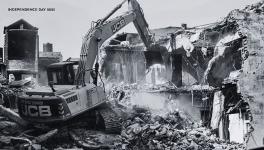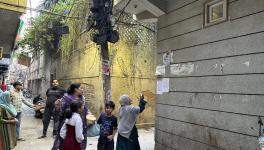DDA’s Master Plan for Delhi-2041 Fails to Address Working People’s Concerns, Says People’s Collective
Representational use only.
The Draft Master Plan for Delhi-2041, released by Delhi Development Authority (DDA) last month, does not address key concerns of the majority of the working people in the national capital, academicians, civil society members and activists argued on Thursday.
The matter came up at a press conference held at the Press Club of India, where key aspects of the draft of the Master Plan, a statutory document that has the power of law to govern urban development in Delhi, were discussed and suggestions for improvement were made. The conference was called for by the 'Main Bhi Dilli' campaign, a collective that aims to make planning in Delhi “more inclusive and participatory.”
The draft of the Master Plan was made public by the DDA on July 6. The DDA is a body of the Union Government and comes under the administrative control of Ministry of Housing and Urban Affairs. The Lieutenant Governor of Delhi (LG) is the chairman of the DDA and exercises executive powers in the Authority.
Public comments on the draft of the plan, the national capital’s fourth since 1962, have been invited within 45 days, up to July 23.
On Thursday, it was argued that while the draft acknowledges informal workers – who are in the majority in the city – across different sectors more than their predecessors, it fails to focus on their issues from the planning perspective.
Take for instance the issue of housing for these workers. The draft plan, while basing its figures on Census 2021 data, says that the housing demand for Delhi – till 2041 – is estimated be at 34.5 lakh dwelling units, with an assumption of an average household size of 4.5 persons.
Mukta Naik, an urban researcher with the think-tank Centre for Policy Research, rued that no break up of this figure into different categories – Economically Weaker Sections (EWS), Low Income Group (LIG), and Middle Income Group (MIG) among others – was provided in the draft. This is particularly important for clear norms and reservations to ensure expansion of affordable rental housing in the city, according to her.
Moreover, “we demand an expansion of regularisation schemes for JJ (Jhuggi-Jhopdi) and slum clusters and granting of secure tenure for residents of resettlement colonies,” she said.
Aravind Unni, who works with the NGO Indo-Global Social Service Society, said that there must be a clear recognition of diverse sectors of informal employment and that provisions in the Master Plan should ensure the protection of their places of work such as homes, streets, markets and waste sorting sites. According to him, the Street Vendors Act, 2014 and Solid Waste Management Rules, 2016 are “completely missing” from the draft plan. “The plan must be in consonance with these existing legislations and policies, he said.
“The [existing legislation] only recognises 2.5 per cent of the city’s population that is engaged in vending business – this number will only go up over the next 20 years,” said Shanti Snigdha of Janpahal, a Delhi-based NGO, adding that the Master Plan then “needs to recognise natural markets and have inclusive vending spaces.”
On the gender question, Subhadra Pandey from the Self-Employed Women’s Association (SEWA) said that between 60% to 70% of the women workers in the national capital are engaged in the informal economy. “There must be more mention in the plan about the needs of home-based workers and domestic workers,” she said.
The draft mentions improving the availability of social infrastructure by treating local level facility plots as “multi-facility plots,” to accommodate multiple uses of them within the community. Pandey welcomed the move and demanded clearer provisions for the implementation of the same. “Such multi-purpose spaces for the community, especially for domestic workers and home-based workers, must be mandated under the Master Plan,” she said.
Sheikh Akbar Ali of the Delhi Round table on Solid Waste Management demanded clearer mandates and enforceable conditions for the integration of informal waste workers. Additionally, suggestions on creating a sustainable urban mobility plan and having clearer norms to protect uses of public space were also shared.
Through the conference, the social activists also demanded that the DDA extends the 45-day window for citizen participation in the making of the Master Plan, to at least six months.
“To give only 45 days during a pandemic to take feedback is a violation of people’s rights and desires to participate in the Plan. The Plan’s success depends on the people’s ownership of it,” said the press statement issued by Main Bhi Dilli.
Get the latest reports & analysis with people's perspective on Protests, movements & deep analytical videos, discussions of the current affairs in your Telegram app. Subscribe to NewsClick's Telegram channel & get Real-Time updates on stories, as they get published on our website.
























